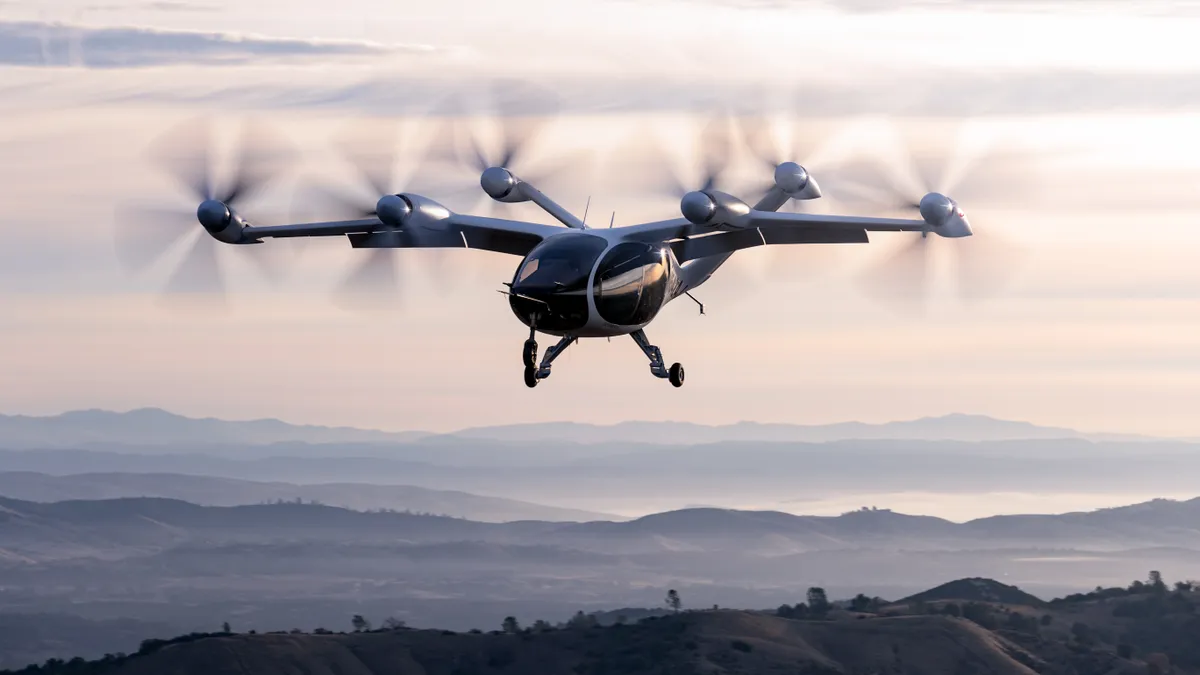UPDATED: August 13, 2021: Joby Aviation started trading Wednesday on the New York Stock Exchange, becoming the first electric vertical takeoff and landing (eVTOL) company to list publicly on the stock market.
The listing, made possible by Joby's acquisition by Reinvent Technology Partners, a special purpose acquisition company (SPAC), values Joby at $4.5 billion.
In a statement, Joby Founder and CEO JoeBen Bevirt said the company would "drive a renaissance in aviation, making emissions-free flight a part of everyday life."
"This is our generation's moonshot moment," he continued.
Dive Brief:
- Joby Aviation announced Wednesday its plans to list publicly on the New York Stock Exchange, and pledged to have a commercial air taxi service operating in 2024.
- To go public, Joby Aviation will be acquired by Reinvent Technology Partners, a special purpose acquisition company (SPAC). The transaction is expected to close in the second quarter and would value Joby Aviation at $6.6 billion.
- Joby Aviation acquired Uber’s air taxi arm — known as Uber Elevate — late last year, and said the move to go public coupled with the more than 1,000 test flights it has completed in the past decade will give it a "substantial first-mover advantage in the aerial ridesharing industry."
After 10+ years of development and 1000+ test flights, we couldn't be more proud to share this film. Our 5-seater aircraft is all-electric, takes off and lands vertically, and can travel 150+ miles on a single charge. Coming 2024. Read more: https://t.co/ZY1uWONBOR
— Joby Aviation (@jobyaviation) February 24, 2021
Dive Insight:
Joby Aviation’s move to go public has been the source of speculation for some time, and their latest announcement represents a significant moment for the burgeoning urban air mobility (UAM) movement. Indeed, Federal Aviation Administration (FAA) officials have said electric vertical take-off and landing (eVTOL) aircrafts — known informally as "flying cars" — are a lot closer to reality than many people realize.
On a conference call to mark the unveiling of the company’s public listing, Joby Aviation Founder and CEO JoeBen Bevirt said its goal is to "save a billion people an hour every day" with its aircrafts, and that the Uber Elevate acquisition will be crucial to help establish an air taxi service in cities. Uber's previous goal had been to test air taxi service starting last year in Melbourne, Australia; Dallas; and Los Angeles, but saw that timeline slip.
"The Elevate team invested nearly five years in the development of market simulation and demand forecasting tools which allow us to understand our network and characterize how our future customers prefer to move around," Bevirt said. "From these insights, we can identify optimal locations for nodes, or Skyports, allowing us to scale up our network and fulfill demand while being extremely efficient in how we roll out infrastructure."
Experts have said previously the UAM and air mobility in general could be impactful, provided there is a national strategy around regulations and public-private partnerships (P3s) to ensure success. A report from Deloitte and the Aerospace Industries Association (AIA) said the sector could be worth $115 billion by 2035, while Los Angeles has been positioning itself to be a leading city in embracing the technology.
And Bevirt said the company will first target cities that have the "very best characteristics, including population density, ability to pay, and existing infrastructure," which he said could include Los Angeles, San Francisco, Miami and New York City, the latter of which saw the launch of the Uber Copter service in 2019.
Joby said the public listing could help it deliver on its promises, as well as its partnership on production with Toyota that it inked in January last year, while the company also agreed on a certification with the FAA on its aircraft. Bevirt said progress will take a while, but the rewards could be enormous.
"It will take us decades to achieve, but the resulting transformation could be more profound than the shift from horses to automobiles a century ago," he said. "And it won't just improve our lives, it will improve our physical environment and it will help reduce our footprint on our precious planet."












